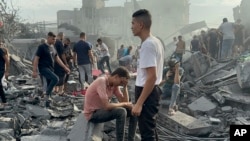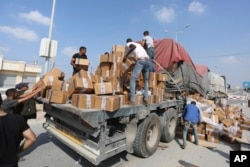The United Nations’ humanitarian agency said Friday that it urgently needed more money to cover the soaring costs of providing lifesaving assistance to millions of people in Gaza and the West Bank.
“The cost of meeting the needs of 2.7 million people — that is, the entire population of Gaza and 500,000 people in the occupied West Bank — is estimated to be $1.2 billion,” said Jens Laerke, spokesperson for the Office for the Coordination of Humanitarian Affairs (OCHA).
The U.N. appealed for $294 million October 12, but Laerke explained that since then, the situation has grown increasingly desperate and “our ability to ease the suffering of the Palestinian population will depend on adequate funding."
Citing Gaza’s Ministry of Health, OCHA said the Palestinian death toll over the past 17 days had reached 9,061, with women and children constituting 62 percent of the victims.
“In terms of internal displacement in Gaza,” Laerke said, “the number has swelled to nearly 1.5 million. That includes nearly 700,000 people sheltering in 149 UNRWA [U.N. Relief and Works Agency for Palestine Refugees] facilities, reaching almost four times their intended capacity.
“And let us not forget the situation in the West Bank, where violence has also been spiking,” said Laerke.
As humanitarian conditions in Gaza continue to deteriorate, settler violence against Palestinians in the West Bank is increasing. Laerke said the U.N. had documented more than 130 deaths and more than 2,200 injuries there since October 7.
"Settler violence and extensive access restrictions throughout the West Bank have displaced nearly 1,000 Palestinians,” he said.
“The situation in the occupied West Bank, including east Jerusalem, is alarming and urgent, amid the increasing and multilayered human rights violations of Palestinians occurring there,” said Liz Throssell, spokesperson for the U.N. high commissioner for human rights.
She said that Israeli forces had increasingly used military tactics and weapons in law enforcement operations and that settler violence, which was already at record levels, had also escalated dramatically, averaging seven attacks a day.
“We have documented that, in many of these incidents, settlers were accompanied by members of the Israeli forces, or the settlers were wearing uniforms and carrying army rifles,” she said. “Along with the near total impunity for settler violence, we are concerned that armed settlers have been acting with the acquiescence and collaboration of Israeli forces and authorities.”
According to Reuters, the Israeli military has reported a sharp increase in operations against militants in the West Bank since the October 7 attack, making 1,260 arrests, of which it said 760 were affiliated with Hamas, which the U.S. has designated as a terrorist group.
Humanitarian and political observers have expressed concern that the Israeli-Hamas war, along with cross-border firing between Israel and Hezbollah forces in Lebanon, could lead to a wider war in the region.
Throssell also deplored the intensification of the fighting in northern Gaza. She said there had been a high number of casualties reported, as well as the reported use of explosive weapons in some of the most densely populated areas in Gaza.
“We have serious concerns that the principles of distinction and proportionality are not being respected by both sides,” she said. “We strongly urge Palestinian armed groups to immediately stop launching inherently indiscriminate rockets into Israel.”
She added that Hamas “must also immediately and unconditionally release all the hostages they hold, in serious breach of international humanitarian law.”
Hamas seized 240 hostages when its fighters invaded Israel on October 7. The militants killed 1,400 people, mostly civilians in their own homes or at a music festival.
“What we want to make clear,” said Throssell, “is that both sides here have obligations under international humanitarian law. That applies to the Israelis, and it also applies to Hamas in Gaza.
“What we should not lose sight of is that people, civilians, are being killed and harmed,” she said. “I think we always need to keep the victims at the forefront of our minds.”





